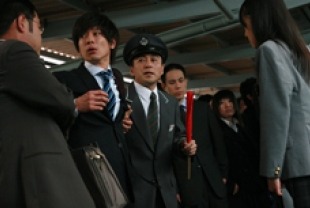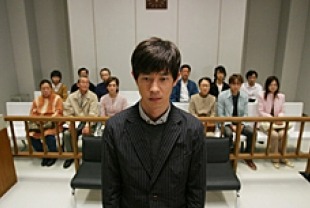Teppei Kaneko (Ryo Kase) is on his way to a job interview when a station guard pushes him at the last minute into a crowded commuter train. His coattails get caught in the door, and he is jammed up against several women. He apologizes to one of them. At the next stop, the other one, a schoolgirl, accuses him of groping her sexually. The first woman contradicts her, but leaves before anyone takes down her testimony. Teppei is taken to the police station office for questioning.
Some very aggressive detectives are convinced that he molested the 15-year-old girl. It is her word against his. They advise him to plead guilty and pay a fine that will compensate the victim, but he is adamant about his innocence. This idealistic young man spends some time in prison until two lawyers agree to take his case: Masayoshi Arakawa (Koji Yakusho) is experienced in these cases, and Riko Sudo (Asaka Seto) is a junior partner. At first she has a hard time with the idea of defending an accused groper but she finally opens her mind to the possibility that Teppei could be telling the truth. The lawyers convince Teppei's mother (Masako Motai) and his best friend Tatsuo (Koji Yamamoto) to fill the courtroom with supporters.
I Just Didn't Do It is a thought-provoking depiction of the Japanese criminal court system. It is the first film by director Masayuki Suo since his 1996 hit Shall We Dance. He has chosen a subject that looms large in Japanese society: the concern over the problem of groping on crowded commuter trains. In the course of his confinement, Teppei learns that it is a tough fight to prove one's innocence in the criminal court system where there is a 99 percent conviction rate. It soon becomes clear to him that the police and the prosecution hold the upper hand. This courtroom drama emphatically reveals the tremendous power wielded by judges in a society that believes that convicting criminals is a way of saving face for law and order enforcers.
Screened at the 45th New York Film Festival, October 2007.

